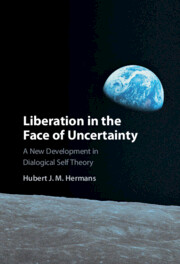Book contents
- Liberation in the Face of Uncertainty
- Liberation in the Face of Uncertainty
- Copyright page
- Dedication
- Contents
- Figures
- Tables
- Preface
- Acknowledgments
- Introduction
- Chapter 1 Playing with Plato
- Chapter 2 Centralization and Decentralization of the Self
- Chapter 3 The Other as Heaven and Hell
- Chapter 4 Re-enchantment of the World
- Chapter 5 Imprisonment and Liberation of the Self
- Chapter 6 Uncertainty in the Self
- Chapter 7 Multiple Well-Being and Other-Inclusive Happiness
- Glossary
- References
- Index
Chapter 1 - Playing with Plato
Published online by Cambridge University Press: 06 January 2022
- Liberation in the Face of Uncertainty
- Liberation in the Face of Uncertainty
- Copyright page
- Dedication
- Contents
- Figures
- Tables
- Preface
- Acknowledgments
- Introduction
- Chapter 1 Playing with Plato
- Chapter 2 Centralization and Decentralization of the Self
- Chapter 3 The Other as Heaven and Hell
- Chapter 4 Re-enchantment of the World
- Chapter 5 Imprisonment and Liberation of the Self
- Chapter 6 Uncertainty in the Self
- Chapter 7 Multiple Well-Being and Other-Inclusive Happiness
- Glossary
- References
- Index
Summary
Plato’s tripartite theory is used as a lens to increase our understanding of Dialogical Self Theory (DST) and to stimulate the further exploration of its personal, social, and societal possibilities. Plato creates links between (a) body parts (head, chest, belly), (b) faculties of the soul (logos, thymos, eros), and (c) societal groups (philosophers, military, artisans). Whereas in Plato’s vision, three main body parts are distinguished, DST is based on the assumption of a multiplicity of body parts that are linked to a multiplicity of embodied I-positions. Furthermore, whereas Plato puts reason (logos) structurally above emotion (eros), DST sees reason and emotion as equivalent and “cooperative” systems. The assumption of reason-with-emotion, instead of reason-above-emotion, creates room for the emergence of dialogical relationships among these central faculties. Finally, whereas Plato distinguishes three hierarchically organized societal groups, DST, as a multipartite theory, interiorizes a broader variety of social groups as participants in a multivoiced democratically organized self.
- Type
- Chapter
- Information
- Liberation in the Face of UncertaintyA New Development in Dialogical Self Theory, pp. 12 - 33Publisher: Cambridge University PressPrint publication year: 2022

